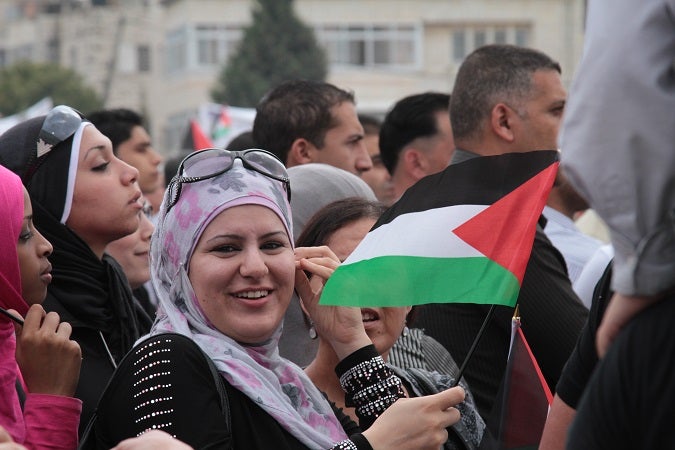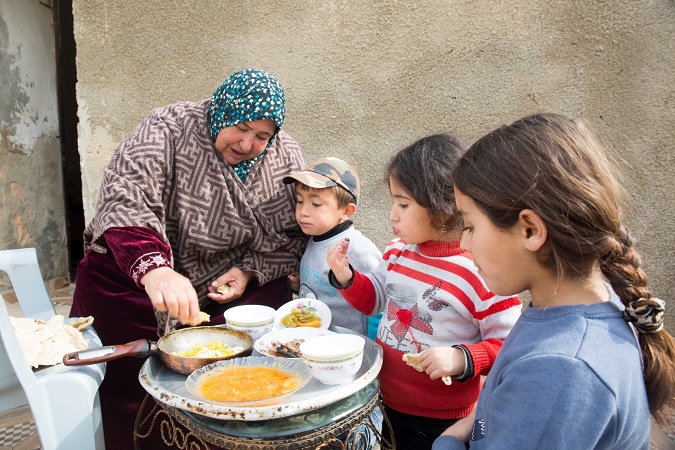Peace, security and humanitarian response

Photo: UN Women
Advancing the Women, Peace and Security Agenda in Palestine
In Palestine, the fight for women’s rights cannot be dissociated from the fight for Palestinian rights and statehood. While women’s contribution to the national struggle is widely acknowledged and the law gives them the right to vote and stand for political office, women continue to be under-represented in decision-making bodies and processes at various levels of public life. Women in Palestine have been largely excluded from formal dialogue efforts to end the Palestinian political division. Their voices and concerns have neither been heard nor included in the various reconciliation talks held and agreements reached since 2005. Existing discrimination and unequal power relations make women more vulnerable to crisis, yet their situation and specific needs continue to remain largely ignored or insufficiently targeted in post-conflict recovery.
Our Solutions
To address these challenges, UN Women has worked in partnership with key national partners to further the Women, Peace and Security commitments (WPS) in Palestine. UN Women’s programmes on WPS are guided by a series of commitments to women’s rights. These include UN Security Council Resolution 1325, and seven supporting UN Security Council Resolutions—1820, 1888, 1889, 1960, 2106, 2122 and 2242. Other key reference points are the Beijing Platform for Action, and the Convention on the Elimination of All Forms of Discrimination against Women (CEDAW). In Palestine, they are guided by the National Policy Agenda (NPA) 2017-2022; the Cross-Sectoral National Gender Strategy (2017 – 2022); the Palestine UNDAF; the Humanitarian Response Strategy (2018-2020); and Palestine National Action Plan (NAP) for the Implementation of UNSCR 1325 (2017-2019).
Download a two-page thematic brief on UN Women's work on Advancing the Women, Peace and Security Agenda in Palestine.
Photo: UN Women/Ahed Izhiman
Gender Equality in Humanitarian Action and Crisis Response
The humanitarian crisis affects women, girls, boys and men differently. As a result, their needs and interests differ, as do their resources, capacities and coping strategies. Women are often the first responders to a crisis, and they play a central role in the survival and resilience of families and communities.
Responding to those needs relies on the continued efforts by humanitarian partners to ensure the protection of all members of the affected population and to guarantee that humanitarian response contributes to gender equality and addresses the needs and priorities of women, men, girls, and boys equitably and effectively.
The UN Economic and Social Council adopted resolutions E/RES/2012/3, E/RES/2013/6 and E/RES/2014/2 in 2012, 2013 and 2014. All three resolutions, recognize that humanitarian action can be strengthened by mainstreaming a gender perspective into all aspects of the humanitarian response. In 2014, resolution E/RES/2014/13 was adopted. It stresses on strengthening the coordination of emergency humanitarian assistance of the United Nations.
Our Solutions
UN Women is committed to ensuring equality between women and men as partners and beneficiaries of humanitarian action. Our work in humanitarian action is guided by global norms and standards. Since 2013, collaboration between UN Women and OCHA has facilitated a process for strengthening gender focus in humanitarian action in the oPt. The collaboration between UN Women and OCHA was solidified in 2015 with the formulation of the first two-year joint action plan for mainstreaming gender in humanitarian action in the oPt. The plan was followed by another joint action plan “Strengthened Gender Focus in Humanitarian Action” (2018-2020). While efforts are ongoing to implement the plan, UN Women is also implementing different humanitarian interventions in the West bank and Gaza to support women’s protection from gender-based violence (GBV) and access to quality multi-sectoral services.
Download a two-page thematic brief on UN Women's work on Gender Equality in Humanitarian Action and Crisis Response.
